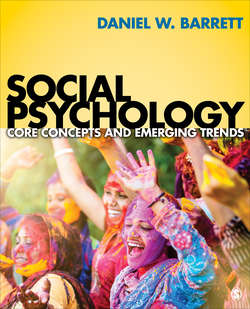Читать книгу Social Psychology - Daniel W. Barrett - Страница 162
На сайте Литреса книга снята с продажи.
Self-Enhancement
ОглавлениеGiven how important it is to feel good about ourselves, it is not surprising that we expend tremendous effort engaging in a variety of self-evaluation and self-enhancement strategies. We continuously monitor how we are doing and adjust our behavior accordingly in an effort to be liked by others, particularly those who are important to us (Church et al., 2014). How do we do this? According to Leon Festinger’s theory of social comparison processes (1954), we first look to unambiguous, objective standards to help determine how we are doing; when such objective measures are unavailable, we resort to subjective social comparison. For instance, if you regularly jog three miles, you can time yourself and track whether or not you are getting faster (or slower!). However, in many important competencies, attributes, and opinions, no objective standards are available. Instead, says Festinger (1954), we will look to others to help with our self-evaluation. Festinger assumed that people are motivated to be accurate in their beliefs and opinions and that social comparison can provide us with critical feedback (Wood, 1996). For example, how do you know what to wear when meeting your partner’s parents for the first time? You ask your partner. Do you think that President Obama is doing a good job? You may have your own thoughts, but it is quite likely that you’ll check around to see what others think—perhaps people in the media, the professor in your history class, your friends—and their opinions will inform your own. You want to hold correct opinions, and social comparison can provide us with important information concerning their accuracy (Mussweiler, Rüter, & Epstude, 2006; Vogel, Rose, Roberts, & Eckles, 2014).
Who are you most likely to compare yourself to? Our general tendency is to compare ourselves with similar others, such as peers or siblings. But if that comparison results in a lowered self-evaluation—like if your little brother is a superior piano player—then you may avoid comparing yourself to him (Lockwood & Matthews, 2007; Nicholls & Stukas, 2011). According to Tesser’s self-evaluation maintenance model (SEM), you’ll typically only make comparisons when they will improve your self-evaluation; if they will make you look or feel good (Nicholls & Stukas, 2011; Tesser, 1988; Wood, Michela, & Giordano, 2000). SEM theory assumes that (a) people are motivated to maintain or enhance positive self-evaluation, and (b) there are two primary ways that people do this: social comparison and reflection (Tesser, 1988).
In the piano player example, if a close friend outperforms us on a dimension that is relevant to our self-concept, then we may attempt to distance ourselves from the friend and not engage in social comparison (Lockwood & Matthews, 2007). Alternatively, we could practice even more to improve our performance, simply avoid the comparison altogether, or give up the piano. To the extent that piano playing is no longer relevant to the self-concept, the reflection process becomes more important than the comparison process. By reflection, Tesser means that we allow the successes of others to reflect on us, thereby helping us to maintain a positive self-image. If your brother is an outstanding piano player, then by more closely associating with him you can enhance your self-esteem, because his success reflects well on you (Tesser, 1988, 2003).
The social comparison and reflection processes are but two of the many strategies people use to manage their self-esteem via self-protection or self-promotion (Hepper, Gramzow, & Sedikides, 2010). Self-protection refers to efforts to maintain or defend one’s positive self-image, whereas self-promotion is focused on enhancing one’s self-image (Alicke & Sedikides, 2009; Higgins, 1997). In the next couple of sections we’ll review some common strategies people use in the service of self-protection and/or self-promotion.
Theory of Social Comparison Processes: Idea that people will evaluate how they are doing using subjective standards when objective standards are not available
Social Comparison: Monitoring how one is doing and adjusting one’s behavior accordingly in an effort to be liked by important others
Self-Evaluation Maintenance Model (SEM): Postulates that a person typically only makes social comparisons when this will improve her or his self-evaluation
